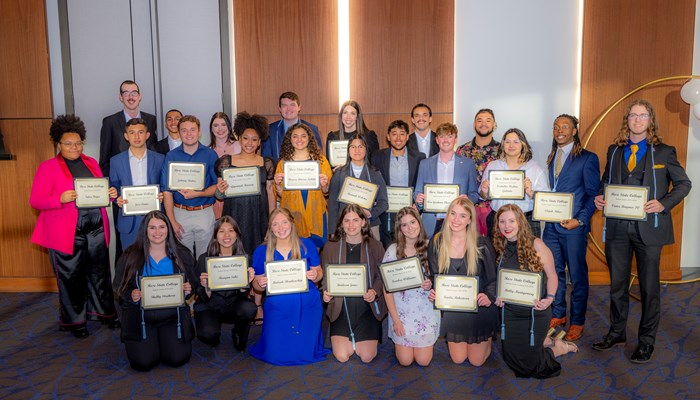Student Spreads Message of Hope, Hard Work Through Literature Published December 11, 2019
 The way Jessica Patterson speaks openly and honestly about her life makes the words seem like they came from fiction novel excerpts.
The way Jessica Patterson speaks openly and honestly about her life makes the words seem like they came from fiction novel excerpts.
The stories of a troubled childhood, an attempt to cope with being a victim of sexual assault, and raising four children while filing for bankruptcy check all the boxes of someone who has overcome adversity to make good of their life. Add in not receiving a GED or enrolling in college until her mid-20s and a relocation halfway across the country to escape the madness, and you have an outline for a book.
So, she told her story, both of her upbringing and her unique child-rearing ways. And when she told her story, the people she came in contact with told her to write a book. So she did. Up next, she wants to construct a children’s book so her four children, and many others, won’t make the same mistakes she did.
Jessica used to be ashamed. Questions of “Why me? Why me? Why me?” flooded her brain. Not anymore.
“It made me tougher as a person today. It made me wiser and allowed me to look at life a little bit different,” said Patterson, an Atlanta, Georgia, native who is now a 27-year-old student at Rose State College.
“I'm not ashamed of where I come from. I'm not ashamed of anything that happened to me. It happened and that's it. I can't be ashamed of anything in my past because my past is building me up to be a greater person.”
Rose State Fosters Relationships
Growing up in a low-income household in Atlanta with a mother battling drug addiction and an absent father, Patterson was set up for failure.
To say few in her family were academically successful would be a nice way of putting it — a GED or high school diploma was a rarity.
Patterson knew she wanted to be different. She wanted to set an example for her children. Receiving a GED before she left Georgia was one of the main accomplishments on her checklist. She crossed that off in 2017. She needed a fresh start, or a different place to plant a new seed, as she eloquently put it, so she uprooted her husband and children to Oklahoma. College was always a thought, but she wasn’t sure where, when, or how it would happen.
Then came a flyer in the mail from Rose State. She felt it was a sign.
“I was so nervous about college because I didn't know how anything worked,” she said. “Everybody was so friendly. They told me how I would take my placement test and how everything would work.”
This past August, she enrolled at Rose State as a sociology major before switching majors. Her biggest worries — how to balance raising four children with work and school — were quickly alleviated thanks to the staff at Rose State. She doesn’t have a secret to balancing everything, but she figured out a plan that worked for her.
At least two days a week her last class is at 12:45 p.m., which leaves her less than four hours to get home, cook dinner, and finish her homework. Then she prepares for typical mom duties like taking her sons to football practice, eating dinner, bathing them, and putting them to bed.
“The professors, they believe in you. That's important,” Patterson said. “A stranger will believe in you quicker than a family member would. My professors made me feel welcome.”
Some of the Rose State faculty, like mathematics professor Tracie Pham, became intrigued when Patterson told more and more details of her story.
Pham was among the faculty who urged Patterson to continue to share her story, specifically how she raises her children. Why? It was refreshing to see someone so willing and open to share something without fear of judgment.
“A lot of people need a reminder that it takes a lot of work and dedication to realize our dreams,” Pham said. “It’s remarkable to hear how someone so young is able to become successful in her life even with the struggles and obstacles she has experienced.” 
Coping With the Past
It’s no coincidence the timeline of Jessica's first book, “Our Type of Normal: What’s Wrong is Right, and What’s Right is Wrong,” stopped when she hit the age of 14. They were some of the most difficult memories she’s dealt with.
At 14, doctors diagnosed her with PTSD and depression stemming from a childhood that included parental instability and sexual assault. A combination of denial and mental health stigmas at the time left these disorders untreated until she was 21.
While raising her teenage sisters, along with her own children, Jessica confronted her demons and decided to take control.
“You can choose to kick mental health's butt or you can choose to let it control you. I chose to kick its butt,” she said proudly. “A lot of people use that as an excuse for why they can't be successful in life. I can't live like that.”
Just like that, she told herself the past wouldn’t define her. Jessica still sees a therapist each Friday to discuss her mental health, but she no longer needs medication.
She doesn’t even discuss her past anymore during her sessions. She talks about her day-to-day life and how to better handle triggers.
“I came up with that decision because my family had let drugs, alcohol, and mental health dictate and control their life, so I said, ‘You know what? I'm not doing that.’ My kids are looking up to me and I got to be an example,” she said.
As she learned to love herself first, she opened up more and more about her story. Back in Atlanta, she received help from the Decatur Cooperative Ministry, which works to prevent homelessness. Jessica was behind on bills and struggling to handle everyday life. They asked her how she was able to smile so much, so she told her story.
They encouraged her to write a book, so she jotted down everything she could remember from her childhood and worked it into story form. She got in touch with CreateSpace, a self-publishing service through Amazon. They provided editing and assistance with the book cover.
All told, she rummaged up about $1,750 to publish the book and six months to write. Some days were better than others. She had to take breaks to visit her counselor and discuss old memories before she could proceed. She repeated this process until she felt comfortable with the healing.
“Her story is amazing! When she tells her story, she is not afraid nor ashamed of her past. It makes her who she is today,” Pham said. “You don’t hear young people speak about life the way she does. Her story shocked me and I’m proud of her. I can’t wait to see what else lies ahead for her.”
Unique Child-Rearing Ways
Jessica learned things the hard way growing up. She was a product of her environment in Atlanta, surrounded by negativity.
No one taught her about the financial aspects of life, like savings, credit scores, and tax returns. Her troubles compounded and ended in filing for bankruptcy.
Then it dawned on her — why don’t we teach our children this? She doesn’t know when her time on this earth will come to an end, so she set out to prepare her children for their future. That meant teaching them the basics like household chores and laundry and more advanced learning associated with finances.
Again, she started writing, notating everything she didn’t learn as a child. Meanwhile, her children, all under 10 years old, would ask if they could have jobs. Initially, she thought they were too young. Then she had a premonition.
“I thought their chores could be like little jobs around the house. I thought, ‘How can I make this a job where they can get pay raises and do this and do that?’” she said. “Parents don't teach you adult things. They handle everything and then when you grow up and go to college, everything is thrown at you. I didn't want that to happen to my children.”
She constructed a rough version of her philosophy at Walmart, a portable version she shows to friends and strangers who want to learn more about her parenting style.
Terry Jr., 10; I’Keriah, 8; Carlos, 7; and Kodie, 4; are responsible for household chores like cleaning their rooms, bathrooms, kitchen, and taking out the trash. Jessica compensates them each week via debit cards she took out in her name.
The pay varies from $5-12 a week and includes monthly food vouchers via food stamps. Pay raises are available every 90 days and range from $0.10 -0.50.
The money is used for things like snacks, toys, and small household items (soap, toothpaste, etc.). Much like a bank, Jessica requires her children to pay a $3 fee for a lost debit card. This teaches responsibility.
“At first, they were wondering what we were trying to do. It's pretty hard to read their minds and figure out what they're trying to say,” said Jessica’s husband, Terry Sr. “We were never taught that as kids growing up in school. We want to teach them credit scores and saving and getting your life together at a young age — teaching them the basics. I wish I would have learned that at a young age.”
The Pattersons provide additional rewards (a chance to move up to a supervisor position) for making good grades, showing respect, and taking accountability for their actions. This comes with a $1 raise.
Up front, the Pattersons provide necessities like food, cable, insurance, sports, and college. They reward their children with a “paid” vacation, which amounts to a family trip. This year, they celebrated in Tampa, Florida.
Additionally, her children can take out loans from her for $0.25. They have a month to pay her back, or else they receive a $2 inconvenience charge. They can take out loans from Terry Sr., with the first loan void of any fees.
They teach their children about online banking and overdraft protection from insufficient funds and the charges associated with them.
Patterson suggests her children save 15% of their paycheck to build an emergency fund. This teaches them budgeting habits and how to save for their future with long-term goals. They also promote building credit scores. In this case, they raise their household credit score with loan repayment, bill payment, and cleaning their rooms on time.
As the children grow, the Pattersons address additional lifestyle information they deem necessary. Until then, the little ones will continue to take part and hold their mother accountable.
“If I use a curse word, they will tell me I need to put a dollar in the jar,” she joked. “They will tell me my room isn't clean or ask if I do my homework.”
Changing Opinions Through Literature
Payday has become a thing in the Patterson household. Even Kevin Hill, principal at Epperly Heights Elementary School in Midwest City, is aware of it.One day, he overheard Terry Jr. jubilantly shout how he was getting paid that day. It’s moments like these that make onlookers believer in the unique system.
“You typically don't hear that. That's adult business when you're talking about finances and money,” Hill said of the Pattersons’ parenting style. “Our school, on paper, we deal with poverty. A lot of our parents don't have money. We can't put everyone in a box, but finances are not aplenty and talking about financial wealth or goals isn't a daily conversation at the table.”
The results are clear. Hill said the Patterson children have made a positive impact on campus. He even sees the methods paying off in negative times.
Hill recalled a time when Terry Jr. got in trouble at school. He was upset, remorseful, and sorry. Hill could see why. Terry Jr. had to pay a small fine as part of his discipline.
“Some parents aren't sure how to give a consequence that is meaningful. Terry took it in the pocket with a fine for what he did,” Hill said. “I've seen a big change. That is immediate. That is real. And you don't have to wait until they’re 18 to take advantage of.”
Needless to say, people raised eyebrows at first. Jessica recalled a story from a skeptical interaction she had with an employee at a cell phone store. The woman questioned Jessica’s rough draft, asking the basis of it. Her opinion changed once Jessica explained the rationale of teaching and informing.
As for Hill, he recognized the true importance when the Patterson children were able to explain their findings.
“When the kids started talking about it is what touched me,” he said. “She's able to communicate. It's when the kids were able to explain their chores, how much they get paid, what do grades mean, their future, how much money they plan to have saved, and their credit scores.”
At first, Jessica was unsure of the interest in her discussion. She started it for her husband and children. Then it started to spread. Parents of her children’s friends would stop by the house and see a list on the wall. The questions began to flow.
Out in public, strangers will ask why her children have debit cards. When they lived in an apartment, she was frequently asked how her children knew how to wash clothes. Her answer? These are things they should know about to survive if she’s not here anymore.
“It’s very different but unique. She’s teaching her kids at a very early age about life — things school doesn’t teach. I never even thought you could teach kids that young about saving money and building credit, but she found a way to do so,” Pham said. “Her youngest child is 4 years old and it’s amazing that she was able to teach a toddler these concepts. That goes to show that anything is possible, and I believe that her kids will be prepared in the future when they become young adults.”
Helping Break Generational Curses
Jessica is a dreamer — quite literally.
Many of her dreams end up in ideas on paper. One dream was vivid about her future. She prefaced this with a disclaimer that she may sound crazy, but she dreamt she was on the BET Awards accepting a Young Achievement Award from the book she wrote.
All her life, Jessica heard about what she couldn’t do instead of what she could. Now, she’s convinced she’ll break a generational curse by helping others.
“If I can teach a 10 year old, an 8 year old, a 7 year old, and a 4 year old this, why can't college students learn this? Why can't high schoolers learn this?” she said. “It doesn't have to be the same way I did it, but it's the concept of it.”
It’s part of the reason why she wants to spread her message. She thinks the world is cluttered with too many people who don’t earn things. She wants to teach the values of hard work.
Besides the book, she wants to hold seminars teaching children about savings and credit. There’s mutual interest between her and Epperly Heights to hold a one-day session for fourth and fifth graders.
She also hopes to reach young mothers, ensuring they aren’t afraid to use their resources. Jessica had her first child at 17 and got married at 18. She urges them to wait on starting a family and getting married. Give yourself time and love yourself, she said. Most of all, don’t be afraid to ask for help.
“I don't know where this journey is going to take me. Hopefully, it takes me far. It might not take me anywhere,” Jessica said. “But I feel excited that if I can't help one person with my story, if I could touch one person, then I'm OK with that.”
Are you interested in learning about the more than 60 academic programs offered at Rose State College? You can contact us using this form, or if you’re ready to get started, apply today.



